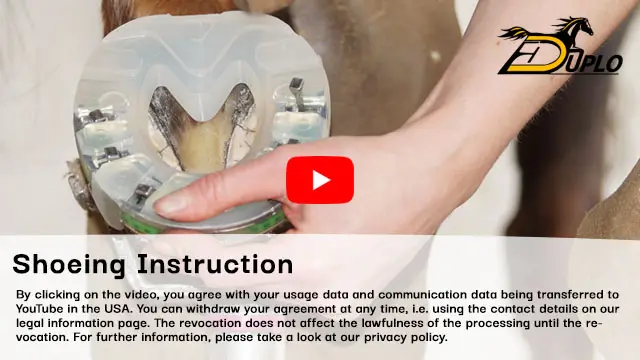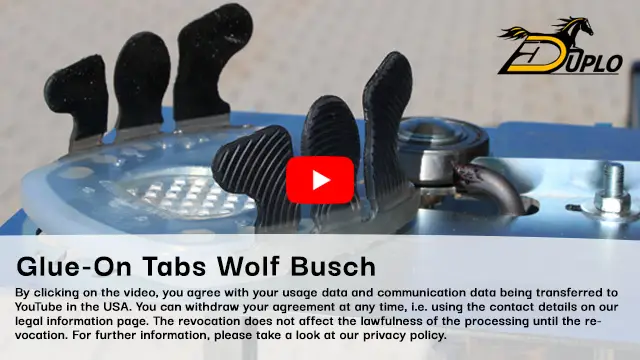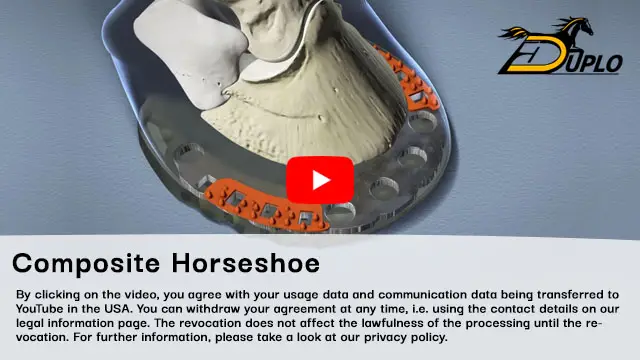Economical Alternative Hoof Protection with Quarter Clips and Increased Profile — the "Basic"
go to the online shopAffordable Horseshoes at Any Price vs. Price Optimization Without Any Loss of Quality
It was a long way to our current composite horseshoes . For a long time we have developed, tested and further refined and we are sure that this path has not come to an end yet. There are always new factors that we have to adapt to - be it climate change, warmer temperatures, volatile winter conditions, etc., to name just a few.
In addition to all the further development and optimization, it is also a concern of ours to be able to offer the most economical composite horseshoe possible. An alternative hoof protection which, like all our composite shoes, combines the advantages of conventional steel shoes and those of pure plastic shoes while remaining as cheap as possible.
Looking for ways to optimize the price in order to offer a cheap but high quality hoof protection, it was clear to us: Two aspects in which many manufacturers aim to reduce costs are absolutely out of the question for us! This is on the one hand a production site in Asia and on the other hand the search for a cheaper material that compromises on quality. It is important to us to keep control of all production steps and to protect the jobs in our region!
The proper material is of immense importance for alternative hoof protection. In this area we do not undertake any risky experiments. Cheaper hoof protection that compromises on quality is not an option for us. We had to work on other points so that we can offer you the Basic horseshoe as our economical model at a cheaper price.
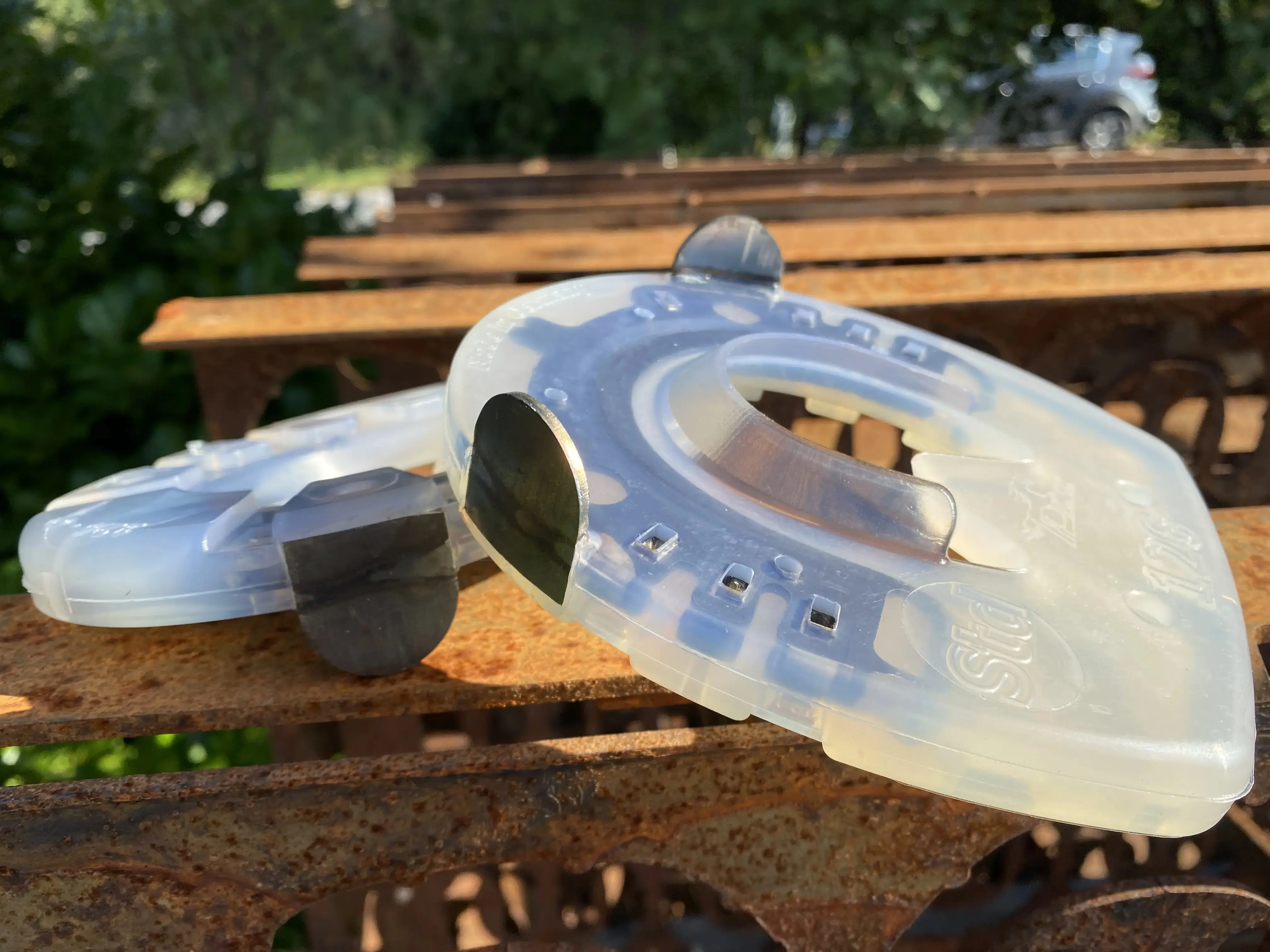
Zinc Coating
The quarter clips and the metal core are not galvanized and can therefore rust more easily. But since this is only a purely visual disadvantage that has no effect on the quality of the horsehoe, we decided to take this step in favor of a cheaper price.
Knobs
Since we have concluded in the last years that our clipped horsehoes are usually sufficiently protected against a twisting or slipping on the hoof, the Basic shoe is produced without knob arrays .
Grinding the Quarter Clips
We do not grind the quarter clips of this model. To prevent injuries, the farrier must grind them on site.
Always remember that the quarter clips of the Basic horseshoe must not only be adjusted to the hoof angle as usual, but must also be grinded prior to use.
Alternative Hoof Protection at a Reasonable Price – Photos
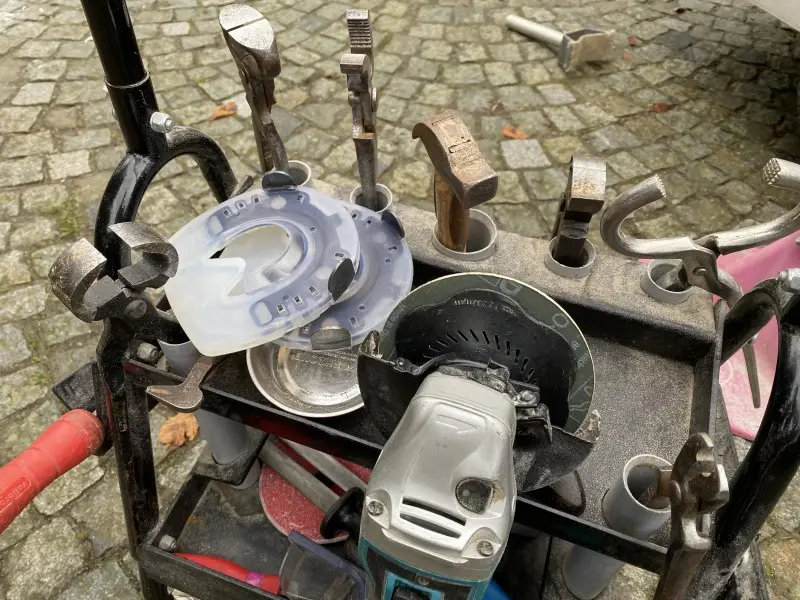
Our composite shoe can be handled with the same farrier tools as a conventional steel shoes.
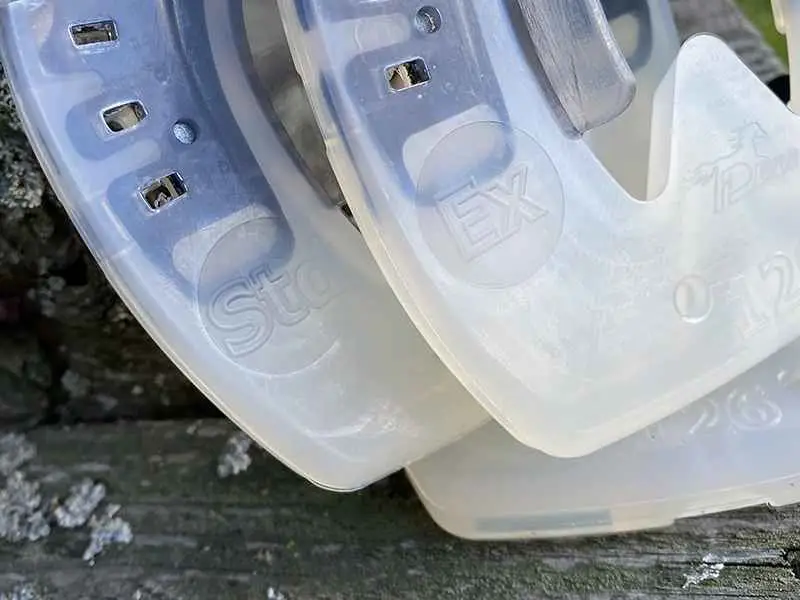
In the case of the less expensive Basic shoe, an abbreviation on the hoof side indicates the degree of hardness: Std for Standard, Ex for Extra.
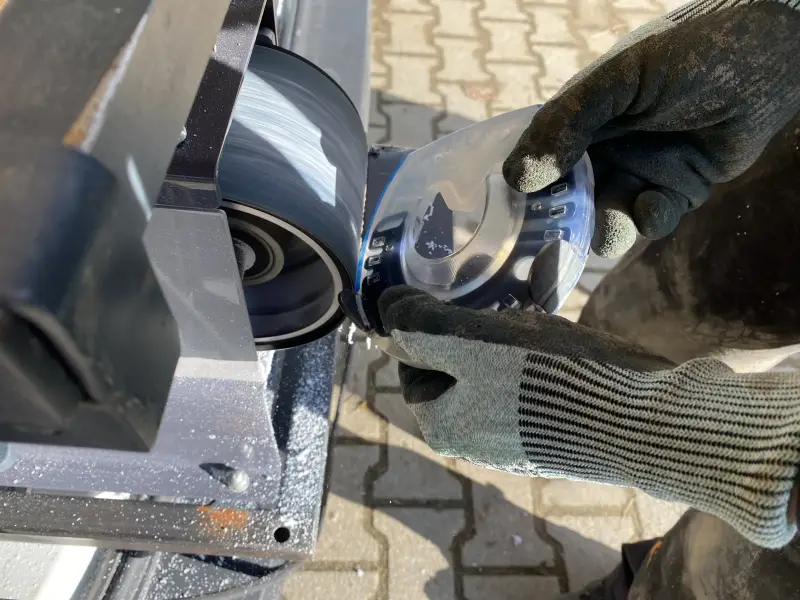
The adjustment of the Basic is quickly done with the help of a belt grinder. Make sure that you do not inhale any grinding dust.
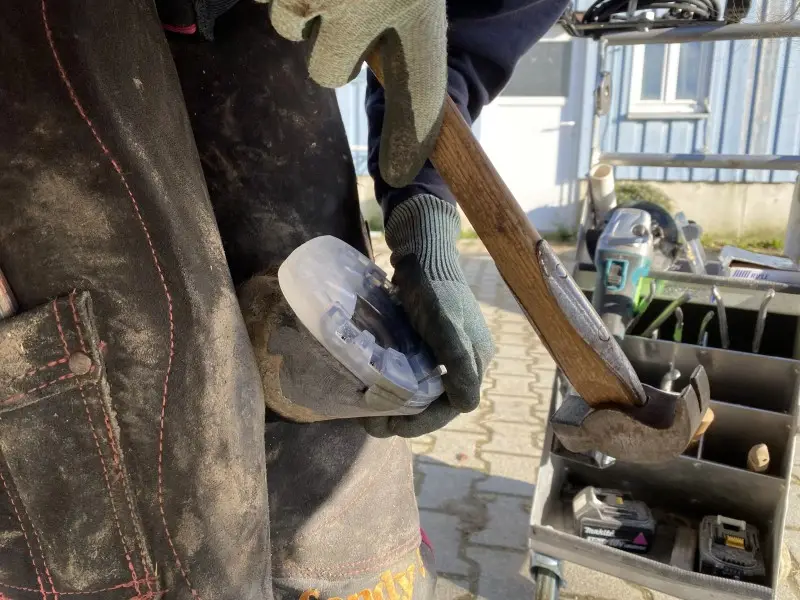
The nail holes are integrated into the metal core. Thus, the nails have a secure hold even during irregular movements.
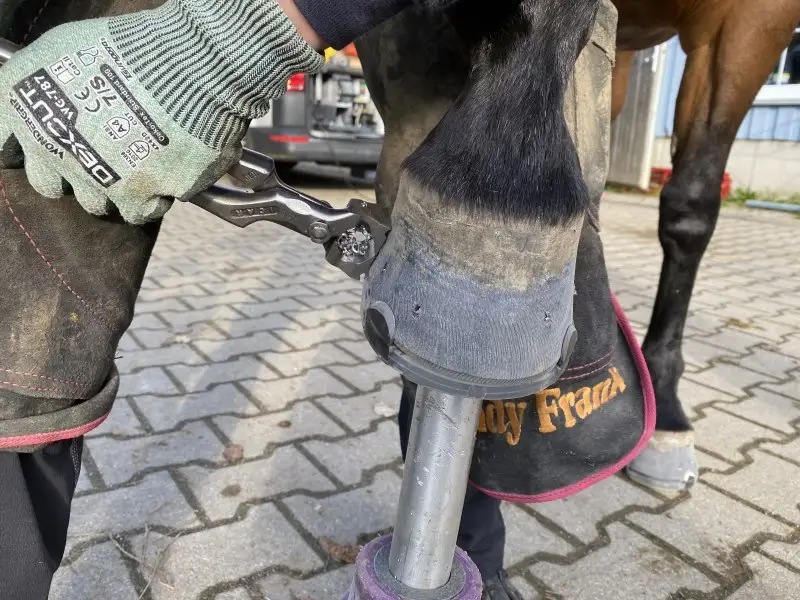
You can also buy the pliers needed for shoeing in our online store.
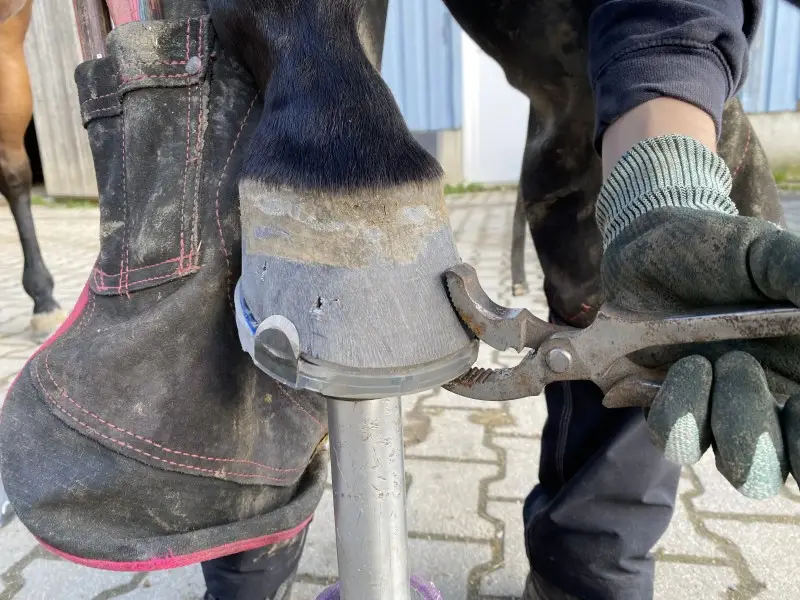
Proper riveting is important to prevent the shoe from twisting or shifting on the hoof.
Application and Safety Instructions - Particularities when Using the Basic - VIDEO
If you work as a farrier and have the necessary expertise in hoof treatment and the proper nailing and clinching/riveting of a horseshoe or gluing a glue-on shoe, you can work well with our products. Nevertheless you have to consider certain aspects while doing this.
In order to avoid injuries to humans and horses, it is important that you read and follow our safety advice when working with our horseshoes or respectively when using our products.
Shoeing Instruction – Nailed Application of a Composite Horseshoe
In our video tutorial on the shoeing instructions, Stephan Becker shows the correct nailed application of our horsehoes - this of course also applies to our cheaper Basic model.
If you have decided to use the Basic model, please remember that you have to grind the quarter clips in order to avoid injories.
Gluing Instruction – Glued Hoof Protection
Usually for a glued hoof protection one uses an un-clipped horseshoe. However, as always, there are situations where it makes sense to use a clipped horseshoe. In this case we recommend the cheaper Basic: Due to the fact that this horseshoe has no knobs, you save the step of manually removing them.
If you have decided to use the Basic model, please remember that you have to grind the quarter clips in order to avoid injuries.
The Composite Shoe and its Advantages for the Horse's Hoof
Even though the Basic has been slimmed down in some beauty aspects in favor of a cheaper price, it has the same functionality as our other horseshoes.
The plastic cover has a shock-absorbing effect and thus protects the horse's sensitive tendons and ligaments of the horse. The metal core provides stability in the area of the bony structures of the hoof. And the plastic bar provides ground contact and can thus improve blood circulation in the hoof. Take a few minutes of your time for our animation video - a picture usually says more than 1000 words.
Special Instructions for a Clipped Horseshoe
The clips - whether they are quarter clips or toe clips - are an advantage for a reliable hoof protection, but of course they also entail certain risks if they are not properly handled and monitored.
Always remember to grind the clips of the Basic before the shoeing process and later adjust them properly to the hoof wall . Protruding quarter clips are always a risk of injury. Please also note our safety instructions regarding the regular inspection of the horseshoe and, of course, also of the quarter clips.
Product Specifications
| General Data and Delivery Information | |
|---|---|
| Model | Clipped and Profiled Horseshoe without Knob Arrays |
| Brand | Duplo |
| Manufactured in | Germany |
| Product Line | Basic |
| Item Numbers | 2150, 2151, 2440, 2441 |
| Packaging Unit | sold individually |
| Shipment | within Canada — for worldwide shipments please contact the Duplo Team in Germany |
| Function and Application | |
|---|---|
| Function | (Alternative) hoof protection, shock absorption, stimulation of the hoof mechanism, economical, cost-saving |
| Riding Styles and Disciplines | among others: leisure riding and orienteering, western riding, dressage , driving, gaited horses riding, baroque riding, ground work, cross-country riding, Working Equitation |
| Horse Breeds | e.g. Warmblood, Thoroughbred, Quarter Horse, Paint Horse, Haflinger, Icelandic Horse, Arabian, Friesian, Andalusian, Hanoverian |
| Season / Hardness Level | Available in both hardness levels and suitable for year-round use. During colder months, we recommend the slightly softer Standard horseshoes. In warmer temperatures, the slightly harder Extra version has proven to be more abrasion-resistant. |
| Measurements, Shapes, Sizes, and Weight | |
|---|---|
| Available Shapes | round (usually fits front hooves) / oval (usually fits hind hooves) |
| Size Determination | Based on hoof shape and the widest part of the hoof (after proper trimming), or, if
necessary,
the size of the previous steel shoes. Feel free to use our free template. |
| Sizes (=Width) | 114mm, 118mm, 122mm, 126mm, 130mm, 134mm, 138mm, 142mm, 146mm |
| Size Intervals | in 4mm steps |
| Length | varies by size – for details please visit FAQ → Sizes and Shapes |
| Thickness | 15mm |
| Weight | between 235–390g depending on size |
| Material and Construction – Special Features | |
|---|---|
| Plastic Coating | The soft plastic coating has a shock-absorbing effect. The bar made of plastic material can improve the blood circulation of the hoof. |
| Hoof Mechanism | The flexible synthetic material encourages the mobility of the elastic hoof structures. |
| Sole Area | The open sole design offers breathability to the hoof
sole
and the frog
. The molded synthetic lip, acts like a debris guard. It helps to reduce the amount of snow and debris balling up . |
| Grip | This model features a deeper tread pattern. For added traction, spikes can be used. Always adjust riding speed according to the ground conditions, especially on slippery surfaces. |
| Knob Arrays | Model without knob arrays. |
| Metal Core | The metal core enhances durability and helps avoid unwanted pressure on the hoof. |
| Nailing Slots | The shoe features 6 to 8 nailing slots integrated into the metal core, depending on
size.
The optimal nail size varies by hoof condition and size. You’ll find general recommendations in our shop under hoof nails. |
| Quarter Clips | Quarter clips make nailing easier and help prevent the horseshoe from twisting or slipping
during the regular shoeing period. Always grind the clips before shoeing to prevent injuries. Be careful to adjust the quarter clips to the hoof angle when shoeing. |
| Shoeing and Customization | |
|---|---|
| Application | nail-on shoe, glue-on shoe or cast shoe |
| Shoeing Instruction | can be found unter FAQ → Instructions |
| Therapy Shoe / Rehab | The model is also suitable for supportive use in the orthopedic and therapeutic field. We expressly point out that our products do not diagnose or cure any diseases and advise for any use with a therapeutic or orthopedic background to work closely with the hoof specialist or veterinarian on site. |
| Customization | Always fit the horseshoe individually to the hoof shape – use an angle grinder, belt
grinder,
hoof nippers, or toeing knife. Advanced modifications (at your own discretion) are possible: narrow, widen, lengthen the shoe or close the sole area; you may also bend or grind a Toe Rocker . More info available under FAQ → Adjustment to the Hoof. |
| Accessories | among others Wolf Busch® glue-on tabs, Extensions , Hoof Sole Protector , wedge , colored stripes, cast hooks |
| Safety Instructions | |
|---|---|
| Safety Information | can be found unter FAQ → Safety Information |
| Safety Instructions as PDF Download | PDF Download |
| Risk of Injuries in Herds | minimized risk of injuries in herd situations and in case of irregular movements in comparison to a steel shoe or the sharp-edged border of a bare hoof - please also read our safety information; the quarter clips must be monitored. |
Tips & Tricks – Successful Hoof Protection with the Basic
Our goal is to support both the farrier and the rider in daily life in the best possible way.
If
you
miss any information around the application of our horseshoes and accessories on our website, just
contact us!
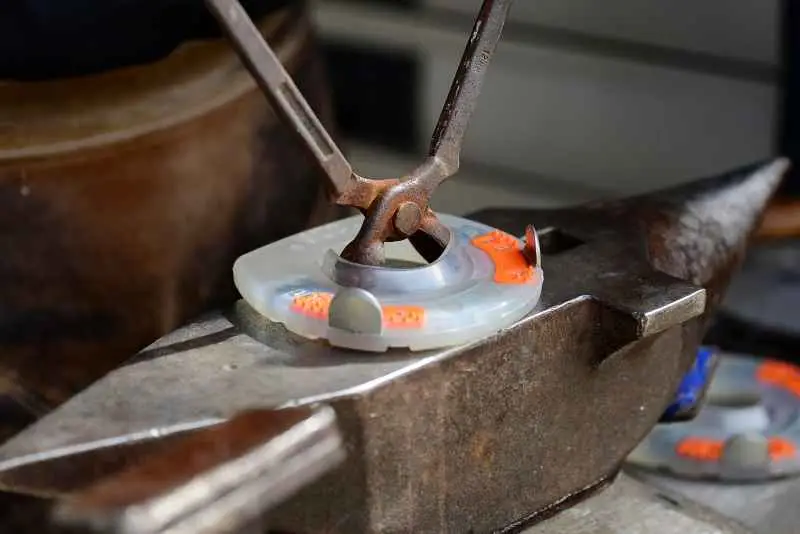
Modifications of a Composite Horseshoe
As a rule of thumb, the round shoes fit the front hooves, the oval shape the hind hooves. Of course, there are always situations in which no horseshoe really wants to fit.
With a steel shoe, you are used to the farrier forging it into the right shape at any time. The good news is: It is also possible with our shoes to shape the hoof protection with a bit of skill (at your own discretion). You can make it more or less wide. We recommend using a small vice or pliers for this purpose.
Adding an Additional Protection against Forging
We have already heard from some customers that the problem of "losing a shoe" has become a thing of the past with the switch to our composite horseshoe. But sometimes nothing really helps and the horse still always manages to pull off a shoe. When we are approached by customers that their horse is constantly losing a shoe, we first look at how the adjustment of the shoe was made. Sometimes one or the other thing can still be optimized here.
Adding an additonal protection against forging on the bottom side of the horseshoe can help in these situations. Thanks to the additional incision in the heel area, the composite shoe gives way more easily and it is less likely for the horse to pull the shoe off.
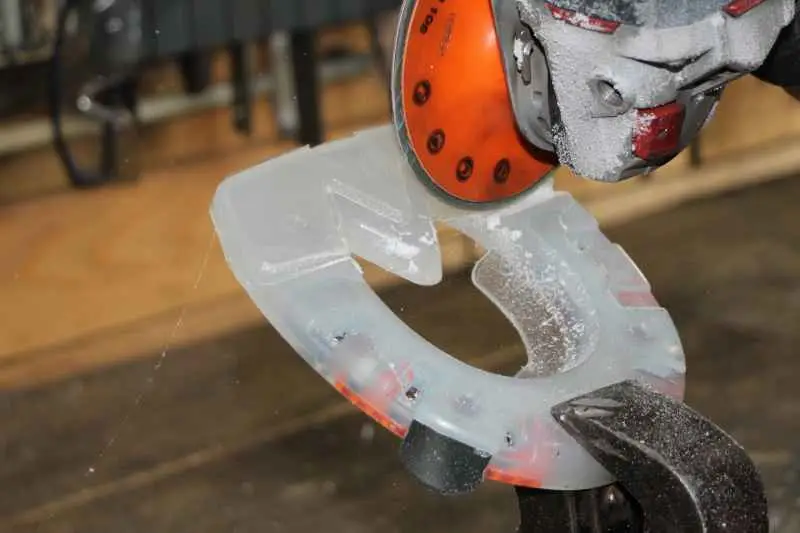
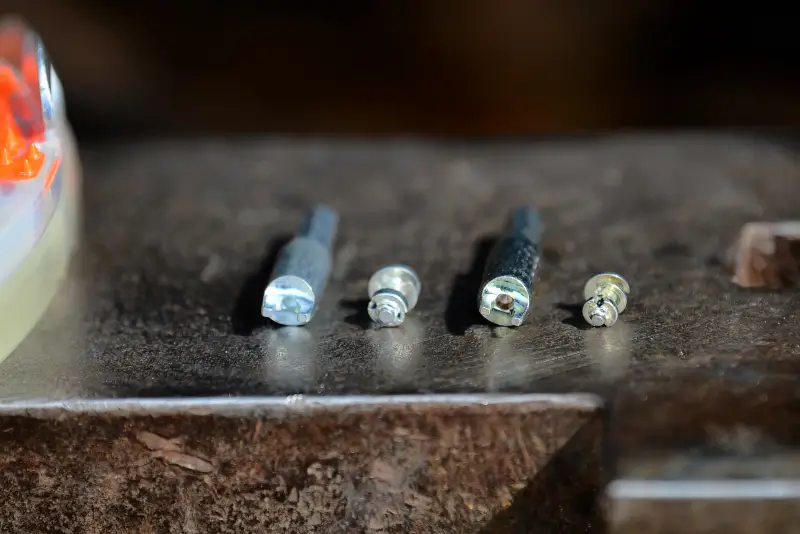
Anti-Slide Protection
The Basic is a clipped and profiled horseshoe. The anti-slide effect of the profile is roughly comparable to a hiking shoe compared to a normal sneaker. Should you require more grip you may add quick studs (spikes) to your horseshoe. The quick studs are similar to the tungsten carbide pins of the steel shoe and are attached with the help of a battery-powered screwdriver with a spike adapter.
Also with additional anti-slide protection - always remember that you must adapt the speed to the ground and weather conditions. You can also find more information in our safety instructions.
Abrasion and Durability
The right mixture of stability, abrasion resistance and weight is the secret of a good hoof protection. Particularly in the field of horseshoes with a plastic cover, it is important that the plastic used is neither too hard nor too soft and that it does not become slippery on a wide variety of surfaces and at a wide variety of temperatures. And last but not least it it should also be abrasion-resistant. With a few exceptions, our shoes are available in two different degrees of hardness: The Standard horseshoes are made of slightly softer plastic material than the Extra models.
When we talk about the issue of abrasion and durability, however, it is not only the product that matters, but also the horse itself and various external influencing factors.
The Influence of the Horse on the Durability of the Shoe
- How are its gaits; how does it raise and lower its hooves?
- Does the horse drag its leg on the ground as it swings, wearing the toe down to the metal part of the shoe or even further?
- How does the horse behave in the box? Calm or restless?
- Does it often scrape with its hooves?
- and much more
External Factors Influencing the Durability of the Horseshoe
- On which surface do you mainly ride? Asphalt, sand, gravel?
- What is the condition of the ground in the paddock and in the box?
- The temperatures - in a very hot summer we often have more problems with abrasion because the ground, especially asphalted roads, also heats up extremely.
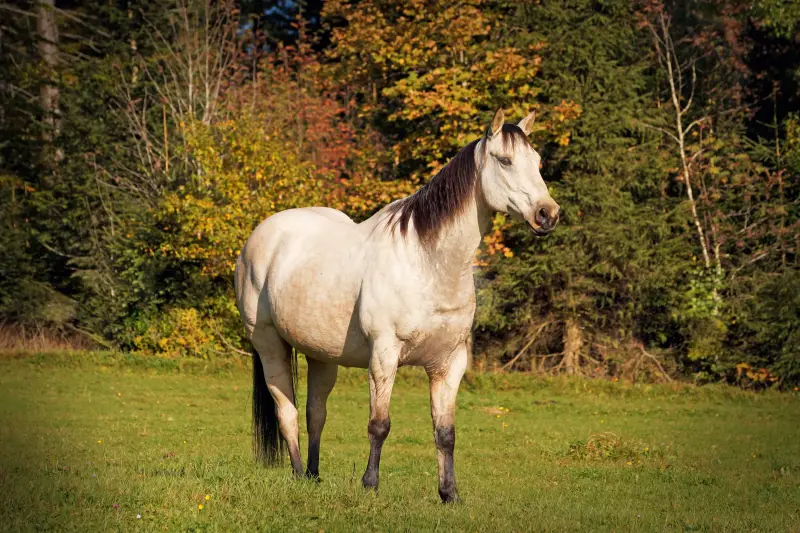
We have many customers who can even use our horseshoes several times. Unfortunately, this is not possible for all. Sometimes, especially in warmer temperatures, it can already help to use the Extra version. In general, we can also state that a horseshoe with a increased profile is a little less abrasion-resistant than a model without increased profile.
If you would like to obtain further information on the subject of abrasion and durability, take a look at the FAQ→ Abrasion and durability section, where we have compiled all aspects for you.

